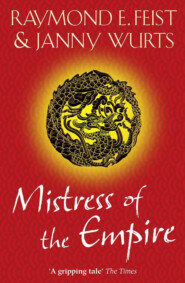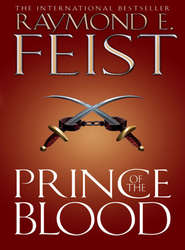По всем вопросам обращайтесь на: info@litportal.ru
(©) 2003-2024.
✖
Daughter of the Empire
Автор
Год написания книги
2019
Настройки чтения
Размер шрифта
Высота строк
Поля
Mara’s voice cut clearly over the confusion. ‘The law says no such thing!’ Stillness fell, and all eyes turned towards her. Poised, angry, yet seeming beautiful in her rich robes to men who had known months or even years of deprivation in the wilderness, she resumed with firm encouragement. ‘Tradition says a worker is a spoil of war. The conqueror decides who is more valued as a free man, and who is to be a slave. The Minwanabi are my enemies, so if you are a spoil of war, then I will decide your status. You are free.’
The silence at this point became oppressive, charged like the shimmer of heat waves above sun-baked rock. Men shifted restlessly, troubled by the upset of order as they knew it, for social subtleties dictated every walk of Tsurani life. To change the fundamental was to sanction dishonour and risk the unbinding of a civilization that had continued unbroken for centuries.
Mara sensed the confusion among the men; glancing first to the farmers, whose faces wore transparent expressions of hope, then to the most sceptical and hardened of the grey warriors, she borrowed from the philosophies learned at Lashima’s temple. ‘The tradition we live by is like the river that springs from the mountain lands and flows always to the sea. No man may turn that current uphill. To try would defy natural law. Like the Acoma, many of you have known misfortune. Like the Acoma, I ask you to join in turning the course of tradition, even as storms sometimes cause a river to carve a new bed.’
The girl paused, eyes veiled by her lashes as she stared down at her hands. This moment was critical, for if even one outlaw cried out in opposition to what she had said, she would lose control. The silence weighed upon her unbearably. Then, without a word, Papewaio calmly removed his helm; the black scarf of the condemned upon his brow lay bare for all to see.
Lujan exclaimed in astonishment, startled as the rest to find a man condemned to death standing in a position of honour in the retinue of a great Lady. Proud of Pape’s loyalty, and the gesture he had made to show that shame could be other than tradition dictated, Mara smiled and laid light fingers on the shoulder of her Strike Leader. ‘This man serves me with pride. Will others among you not do the same?’ To the farmer displaced by the Minwanabi she said, ‘If the Lord who vanquished your master wishes another farmer, then let him come for you.’ With a nod towards Keyoke and her warriors, she added, ‘The Minwanabi will have to fight to take you. And upon my estate you shall be a free man.’
The farmer sprang forward with a wild cry of joy. ‘You offer your honour?’
‘You have my honour,’ answered Mara, and Keyoke bowed to affirm his loyalty to her command.
The farmer knelt where he stood, and offered crossed wrists to Mara in the time-honoured gesture of fealty. ‘Lady, I am your man. You honour is my honour.’ With those words the farmer announced to all that he would die as readily as any of her warriors to defend the Acoma name.
Mara nodded formally, and Papewaio left her side. He wended his way through the bandit company until he stood before the farmer. By ancient ritual, he placed a cord about the man’s wrists, then removed the mock bonds, showing that the man who might have been kept as slave was instead accepted as a free man. Excited talk broke out as a dozen other men crowded around. They knelt in a circle around Papewaio, eager to accept Mara’s offer and the hope of a new life.
Keyoke detailed a warrior to gather the newly sworn workers together; Acoma guards would accompany them back to the estate, where they would be assigned housing and field work by Jican.
The remaining company of bandits watched with the hope of the desperate as Mara spoke again. ‘You who were outlawed, what were your crimes?’
A short man, pale with sickness, called hoarsely. ‘I spoke ill of a priest, Lady.’
‘I kept grain back from the tax collector for my hungry children,’ cried another.
The list of petty misdemeanours continued until Mara had ascertained the truth of Lujan’s claim that thieves and murderers found no sanctuary within his company. To the condemned she said, ‘Leave as you will, or take service as free men. As Ruling Lady of the Acoma, I offer you pardon within the borders of my lands.’ Although imperial amnesty was beyond the authority of any Ruling Lord or Lady, Mara knew no minister of the imperial government would likely raise objections over the fate of a lowly, next-to-nameless field hand – especially if he had never heard of such an amnesty.
The pardoned men grinned at the cleverness of the Lady and hurried to Papewaio to swear service. They knelt gladly. As Acoma workers they might face threat from Mara’s enemies, but danger in service to a great house was preferable to their bitter existence as outlaws.
The shadows of the afternoon lengthened beneath the trees; golden light scattered through where the branches were thinnest. Mara looked at the depleted ranks of the outlaw band, and her gaze settled at last upon Lujan. ‘You soldiers without masters, listen carefully.’ She paused, waiting while the jubilant talk of the newly sworn workers dwindled down the road. Delicate next to Papewaio’s muscled fitness, Mara challenged the gaze of the roughest and most unkempt among Lujan’s followers. ‘I offer a thing no warrior in the history of the Empire has known: a second beginning. Who among you will return to my estate, to shape anew his honour … by kneeling outside the sacred grove and offering oath to the natami of the Acoma?’
Silence descended upon the glade, and for a moment it seemed that no man dared to breathe. Then pandemonium erupted. Men shouted questions and were shouted down in turn by others who claimed to know answers. Dirty hands jabbed the air to emphasize points of law, and feet stamped earth as excited men jumped to their feet and surged towards Mara’s wagon.
Papewaio stopped the rush with drawn sword, and, hurrying from the wagons, Keyoke shouted a command.
Silence fell; slowly the bandits settled. Quiet once more, they waited for their leader to speak.
Respectful of Papewaio’s vigilance, Lujan bowed carefully before the girl who threatened to upset the life he had known past recovery. ‘Lady, your words are … astonishing … generous beyond imagining. But we have no masters to free us of our former service.’ Something akin to defiance flickered in his eyes.
Mara noticed and strove to understand. Though roguish, even handsome beneath his grime, the outlaw bore himself in the manner of a man threatened; and suddenly the girl knew why. These men simply owned no sense of purpose, living from day to day, without hope. If she could make them take fate back into their own hands and swear loyalty to the Acoma, she would gain warriors of inestimable value. But she had to make them believe once more.
‘You have no service,’ she said gently to Lujan.
‘But we gave oath …’ His voice fell to barely above a whisper. ‘No offer like this has been made before. We … Who among us can know what is honourable?’ Lujan seemed half pleading, as if he wished Mara to dictate what was right; and the rest of the company looked to their chieftain for guidance.
Suddenly feeling every inch the unseasoned seventeen-year-old novice of Lashima, Mara turned to Keyoke for support. The old warrior did not fail her. Though he was as discomforted as Lujan by this abuse of tradition, his voice remained calm. ‘A soldier must die in the service of his master, or be dishonoured, so it is held. Yet, as my Lady points out, if fate decrees otherwise, no man is fit to argue with the gods. If the gods do not wish you to serve the Acoma, their displeasure will certainly be visited upon that house. My Lady assumes that risk, in her own behalf, and yours. With or without the favour of heaven, all of us will die. But the bold among you will chance misfortune,’ and he paused for a long moment before adding, ‘and die as soldiers.’
Lujan rubbed his wrists, unconvinced. To anger the gods was to invite utter ruination. At least as an outlaw the miserable existence he would endure for life might expiate his failure to die with his master, perhaps earning his soul a higher station when it was next bound to the Wheel of Life.
As the bandits reflected the nervousness of their leader, each plainly divided within himself, Papewaio scratched his scar and said thoughtfully, ‘I am Papewaio, First Strike Leader of the Acoma. I was born to service with this house, but my father and grandfather counted kin with cousins serving the Shinzawai, the Wedewayo, the Anasati …’ He paused and, when no man spoke, added the names of several more houses.
Lujan stood frozen, his eyes half-closed, as behind him a man called out. ‘My father served the house of Wedewayo, where I lived before I took service with the Lord of the Serak. His name was Almaki.’
Papewaio nodded, thinking quickly. ‘Was this the Almaki who was cousin to Papendaio, who was my father?’
The man shook his head in disappointment. ‘No, but I knew him. He was called Little Almaki, as my father was Big Almaki. I had other cousins of my father serving there, though.’
Papewaio beckoned the man from the ranks, and out of Mara’s hearing they spoke quietly for several minutes. After an animated interval the bandit broke into a broad grin, and the Strike Leader turned to his mistress with a deferential bow. ‘My Lady, this is Toram. His uncle was cousin to a man who married a woman who was sister to the woman who married my father’s nephew. He is my cousin, and worthy of service to the Acoma.’
Mara hid a smile behind her sleeve. Pape and the obviously clever Toram had seized upon a simple fact of Tsurani culture. Second and third sons of soldiers by tradition were free to take service with houses other than those in which they were born. By treating this grey warrior as if he were a youth, Papewaio had circumvented Lujan’s question of honour entirely. When Mara had recovered her decorum, she said simply, ‘Pape, call your cousin into our service, if he is willing.’
Papewaio caught Toram’s shoulder in brotherly fashion. ‘Cousin, you are called to serve the Acoma.’
The man raised his chin with newfound pride and crisply announced his acceptance. ‘I will come!’
His words touched off a rush among the outlaws, as men crowded around the dozen Acoma soldiers and begun exchanging the names of relations. Again Mara fought down a smile. Any Tsurani of noble birth, or any soldier, knew his bloodlines back several generations, as well as cousins, aunts, and uncles, most of whom he knew by name only. When two Tsurani met for the first time, an elaborate inquiry after the health of relatives began, until histories were exchanged and the two strangers knew who stood higher upon the social ladder. It was almost impossible that, after sufficient conversation, some tenuous relationship would not be discovered, allowing the grey warriors to be called to service.
Mara allowed Papewaio to offer his hand so she might step down from the wagon. Bandits gathered in knots around different soldiers, happy voices shouting out questions and answers as relationships were determined. Lujan shook his head in wonder and faced Mara, his eyes alight with poorly masked emotions. ‘My Lady, your ruse to capture us was masterful and … alone would have made me proud to serve you. This …’ His hand waved at the milling, excited men. ‘This is beyond understanding.’ Nearly overcome by his feelings, he turned away a moment, swallowed hard, then looked back at Mara, his face again a proper Tsurani mask, though his eyes were shining. ‘I do not know if … it is right, but I will take service gladly, and I will make Acoma honour mine. My life will be yours as you will, my Lady. And should my life be short, it will be a good life, to again wear house colour.’ He straightened, all trace of his rakishness put aside. He studied Mara for a long moment, his eyes locked with hers. The words he spoke then impressed her ever afterward with their sincerity. ‘I hope fate spares me death for many years, mistress, that I may stay near your side. For I think you play the Game of the Council.’ Then with a near loss of self-control, moisture gleamed in his eyes and his face split in a grin. ‘And I think the Empire will never be the same for it.’
Mara stood silent, while Lujan bowed and moved away to compare relations with the Acoma soldiers and find common kin, no matter how distant the tie. Then, with Keyoke’s permission, he sent runners to camp to call the rest of his following to the spring. The latecomers arrived in varying states of disbelief. But when they saw the Lady seated upon the thyza wagon as though she held court in the pillared shade of her estate hall, their scepticism lost impetus. Convinced in the end by the exuberance of comrades already sworn to Acoma service, they recited lists of cousins and in-laws until they, too, had regained the honour of house service.
Afternoon passed, the trees above the rim of the ravine striping the clearing with lengthened shadows. The heat lessened and the late breezes bore a woodsy scent, as the branches above the caravan rustled restlessly. Satisfied with the events of the day, Mara watched a flock of gaguin birds swoop down to feed upon insects blown along by the breeze. As they finished their meal and sped raucously off to the south, she realized how tired and hungry she was.
As though thinking in concert with her, Keyoke paused by Mara’s side. ‘Lady, we must leave directly if we are to reach your estate by nightfall.’
Mara nodded, longing now for soft cushions in place of rough bags of thyza. Weary as she was of the stares of hungry men, the privacy of her litter seemed suddenly inviting. Loudly enough for the men to hear, she called, ‘Let us be away, then, Force Commander. There are Acoma soldiers here who would like a bath, a hot meal, and rest in a barracks where the fog won’t dampen their blankets.’
Even Mara could not keep her eyes free of moisture at the shout of unalloyed joy that sprang from the lips of the bandits. Men who so recently had stood ready to fight against her now were eager to defend her. Silently the girl gave thanks to Lashima. This first victory had come easily; but against the strength of the Minwanabi, and the scheming cleverness of the Anasati, in the future her success would come with difficulty, if at all.
Jostled back against the cushions as her slaves raised her litter, Mara felt limp. She allowed herself a deep sigh of relief. All the doubt and fear suppressed through armed confrontation and negotiation with the bandits surfaced behind the privacy of her curtains. Until now she had not dared admit how frightened she had been. Her body quivered with unexpected chills. Aware that dampness would mar the fine silk of her gown, she sniffed and suppressed a maddening urge to weep. Lano had ridiculed her emotional outbursts as a child, teasing her about not being Tsurani – though women were not expected to hold themselves in check the way men did.
Remembering his laughing banter and the fact that she had never seen her father betray any uncertainty, any doubts or fears, she closed her eyes, immersing herself in an exercise to calm herself. The voice of the teaching sister who had schooled her at the temple of Lashima seemed to answer within her mind: learn the nature of self, accept all aspects of self, then the mastery can begin. Denial of self is denial of all.
Mara sniffed again. Now her nose dripped also. Pushing her sleeves out of harm’s way, she silently admitted the truth. She had been terrified, most so at the moment she had thought the bandits might be attacking her estates while she futilely searched the hills for them.
Again Mara scolded herself: this is not how a Ruling Lady acts! Then she understood the root of her feelings: she didn’t know how a Ruling Lady was expected to act. Lacking any schooling in governance, she was a temple girl thrust into the deadliest contest in the Empire.
Mara reviewed an early lesson from her father: doubts could only cripple one’s ability to act decisively; and in the Game of the Council, to hesitate was to die.
To avoid dwelling on weakness, Mara peered through a crack in the curtains at the newly recruited Acoma retainers. Despite soiled clothing, haggard faces, arms like sticks, and eyes of frightened animals, these men were soldiers, yet now Mara recognized a quality in them she had failed to see before: these outlaws, even the roguish Lujan, had been just as frightened as she. Mara found that perplexing, until she reconsidered the ambush from their perspective. Despite being outnumbered, the Acoma warriors were all battle-tested soldiers, properly armed and fit. Some of these grey warriors hadn’t seen a decent meal in a year. And their weapons were an odd assortment of discarded, stolen, or crudely fashioned swords and knives. Only a few had anything like a shield and none wore body armour. No, thought Mara, many of those sad, desperate men must have expected some of their unfortunate brotherhood to die this day. And each would have wondered if he’d be among that number.
The men marched unaware of their mistress’s observation. Their faces revealed a play of other emotions, among them hope and the fear of false hope. Mara sank back upon the cushions, absently focusing on the colourful design of the litter’s tapestry covering. How had she suddenly come to see all these things in these men’s faces? Could her fear have triggered some perceptiveness she had not understood within herself? Then, as if her brother, Lanokota, sat beside her, memory of his presence filled her mind. If she closed her eyes she could hear him whisper, ‘You are growing up, little sister.’
Suddenly Mara could no longer contain her tears. Now her weeping did not arise from sorrow but from a jubilant upwelling similar to the joy she had known when Lano had last won the summer games in Sulan-Qu. On that day Mara and her father had cheered like peasants from the stands, for a time unconcerned with the mores of social status and decorum; only now her emotions swept her tenfold more powerfully.
She had won. She had tasted her first victory in the Game of the Council, and the experience whetted her wits, left her yearning for something more and greater. For the first time in life she understood why the great Lords strove, and even died, for the chance to gain in honour.
Smiling through the tracks of tears, she allowed the motion of the litter to relax her body. No one she faced across the invisible gaming table of Tsurani politics would know of this move, at least not directly and not for some time. But where Minwanabi treachery had reduced the Acoma home garrison to fifty soldiers, she now commanded the loyalty of better than two hundred. Since grey warriors were scattered in hideouts the breadth of the Empire, she could employ these men to recruit more. Should she gain but another week from her sending the box with the feather and cord to the Lord of the Minwanabi, then she might have five hundred or more soldiers to offset his next threat. Mara felt joyous. She knew victory! And two voices arose from memory. On one hand the teaching sister said, ‘Child, be wary of the lure of power and triumph, for all such things are transitory.’ But Lano’s impetuous voice urged her to appreciate her accomplishments. ‘Enjoy victory while you can, Mara-anni. Enjoy it while you can.’











